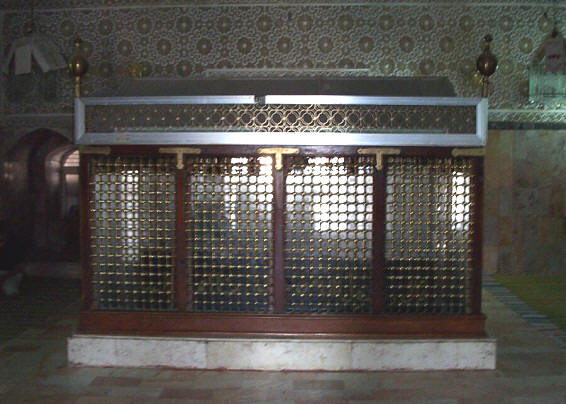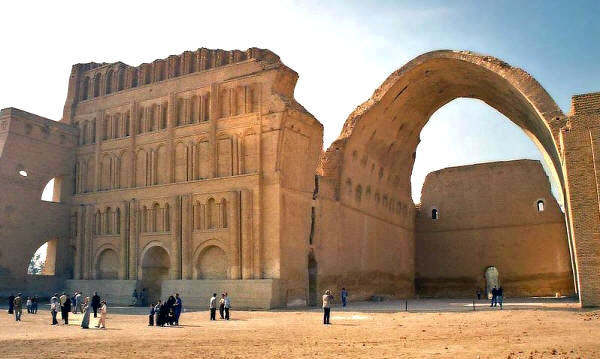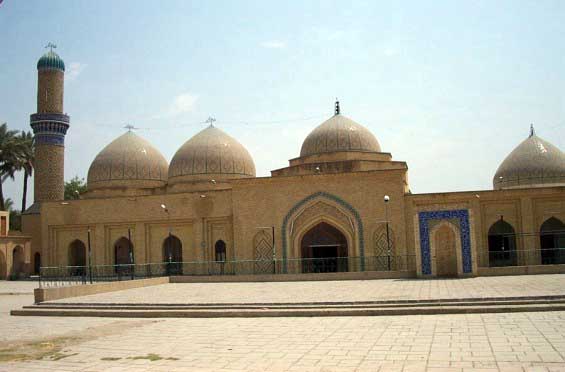
| EARLY ISLAMIC HISTORY - 1 The Persian-Zoroastrian Connection - Salman Parsi / Farsi (568-644 CE) :
The Salman Farsi Shrine at Mada'in / Salman Pak. Photo credit: IPC Salman Parsi is revered by Muslims and considered a traitor by Zoroastrians and nationalist Iranians. One way or another, he is an important part of history and has gained much notoriety.
What puzzles us, is that given his reverence by both Shia and Sunni Muslims, why his mosque and shrine in Iraq were bombed in recent years. Salman's shrine at Al-Mada'in was attacked and damaged on February 25 and 26, 2006, in the violence following the destruction of the Al-Askari Mosque. We read that it was damaged again in December 2006. We also understand from al-islam.org that another Salman al-Farsi mosque in Medina, Saudi Arabia, in earlier years (1920s?) had also been damaged or destroyed.
Mohammad (570-632), Messenger of God and founder of the Islamic religion, declared to his followers that Salman the Persian - Salman Parsi (the Arabic language does not have a 'p' sound so Parsi became Farsi) was one of the People of the (his) House, the ahl al-Bayt. This designation placed him at the Prophet's right hand. Salman was also a member of Mohammad's inner council, the Sahaba. Salman, therefore, became one of the few, if any, non Arabs in Mohammad's inner-most circles. As Salman was intimately involved with the Zoroastrian and Christian religions, he would have brought that knowledge and experience to Mohammad's inner circle. Both Muslims and Zoroastrians have practices in common. For instance, both are enjoined to pray five times a day. Ali said of him that he was like Luqman the Wise. And Kab al-Ahbar said, "Salman is stuffed with knowledge and wisdom - an ocean that does not dry up." Salman was perhaps the most literate within the inner circle and stands in juxtaposition to the Prophet's own illiteracy.
The Shia, Alawi and Sufi hold Salman Parsi in high regard. The Alawi count Salman to be the Bab (door) within an esoteric trinity which includes Ali and Muhammad. There is some speculation that the name Mu-salman contains Salman's name. This could be coincidence.
Salman, born Rouzbeh, reportedly in Jiyye, or the city of Kazerun in Fars Province, or in Isfahan city, was reputed to have been a Magian, i.e. a Zoroastrian charged with maintaining an ever-burning fire. Apparently, Salman enamoured by Christianity, became a Christian, and travelled to Mosul and Rome. His travels took him to Arabia where he met Mohammad, an event preordained by one of Salman's Christian mentors. The prophecy included Salman finding a mark on Mohammad's back. In the process Salman had become a slave of a Jewish merchant in his travels to Arabia. Salman therefore had experience with the Zoroastrian, Christian and Jewish religions and peoples before he finally met Mohammad.
It was common for Arabians to declare their tribal affiliation to others. When asked about his tribe, Salman declared, "I'm the son on Islam! I was lost! So, Allah's guided me to Muhammad. I was poor! So, Allah's made me rich with Muhammad. I was a slave! So, Allah's released me with Muhammad. This is my tribe!" He is also reputed to have declared. "I am Salman, the son of Islam from the children of Adam."
We read that Salman participated in the battles against the Persians and in the establishment of a Muslim administration in Kufa (in today's Iraq). We also understand that he translated the Qu'ran into Persian.
After Mohammad's death, he was appointed governor of Ctesiphon, called al-Mada'in by the Arabs, a town in present-day Iraq about 35 km south of Baghdad. Ctesiphon was once the grand winter capital of the Sassanian empire. Earlier in history during the first century BCE, the Iranian Parthava (Parthians) had made Ctesiphon their winter capital.
Salman Parsi died at the age of 78 during the reign of the third Caliph, Uthman ibn Affan. In the vicinity of today's Ctesiphon is situated Salman Pak, a town named after Salman. Salman Pak is today the site of the Arch of Ctesiphon, the meagre remains of the once majestic Persian Sassanid capital's buildings, one of the largest and oldest freestanding arches in the world.
The Salman Farsi Mosque at Mada'in / Salman Pak. Photo credit: IPC Raids
on Caravans :
The early Muslims started by raiding caravans travelling to and from Mecca. Mecca at that time was one of the richest and most powerful cities in western Arabia - and trade was at the root of its wealth.
Besides Mecca had chased Mohammed out and had become the object of his wrath and desire for retribution (we understand that two members of the Quraishi tribe of Mecca dumped a bucket of sheep excrement on Mohammed). On being chased out of Mecca, Mohammad and his followers fled to Medina, an event called the Hijrah. Medina lay on the lucrative caravan trade route to the north, and it is from Medina that Mohammad, himself a former trader employed of a woman who became his wife, decided to launch his raids of the caravans to and from Mecca. His cousin and son-in-law Ali participated in these raids. In at least one instance, a fifth of the loot was to be given to Muhammad personally.
The Trade Connection :
The Iranian-Aryans had negotiated and established legal guidelines with each kingdom through which their routes passed. Essentially they amounted to a tax in exchange for protection against bandits and pirates. The maintenance and enforcement of such laws depended on society that existed by the rule of law. Nomads and nomadic or semi-nomadic tribes (such as Scythians and Bedouins) were a law unto themselves and they felt free to raid or rob caravans as long as they could resist or evade retribution. The raids often resulted in the killing of the traders. The raiders saw piracy and murder as no crime.
It is not merely coincidental that the Arabs eventually focused on gaining and controlling the Persian empire to the extent that it had been expanded by Darius the Great. The Persian empire under Darius stretched from North Africa to the borders of China and India. That control would come later. In the initial stages, raiding the caravans was a source of immediate wealth as it was for various nomadic tribes.
First Three Raids :
In September 622 CE, some six months after the Hijrah - Mohammed's flight from Mecca to Medina - Muhammad placed thirty to forty of his men under the command of his uncle Hamza ibn 'Abd al-Muttalib and ordered them to raid a Meccan caravan. This first raid appears to have been his first offensive act against the Meccans after the Hijrah and the humiliating manner in which the Meccans had treated him.
The Muslims came across the caravan encampment near al-Is on the seacoast between Mecca and Medina. The caravan was led by Abu Jahl (Amr ibn Hisham) and was guarded by three hundred Meccan riders. Perhaps because they saw that the caravan was well defended, the raiders decided a raid was futile and departed from the scene with no booty.
The next two raids in March 623 did not yield any booty either, perhaps because the caravans were adequately protected. The third raid was conducted with sixty men.
Mohammed Leads the Fourth & Fifth Raids :
The fifth raid was conducted by two hundred men and once again Mohammed led the raid. Even though the rich caravan of fifteen hundred camels was protected by only a hundred men, the caravan eluded the raiders by taking a secret route. Afterwards, Muhammad then went to Dhat al-Saq in the desert of al-Khabar. There, he prayed for God's guidance. Later a mosque was built at that spot.
Sixth Raid & Intelligence :
Raiding caravans required good dependable intelligence about when the caravans were leaving, their route, what wealth they were carrying and the extent of their protection. Mohammed was becoming more astute with each failure. He had all the qualities of an exceptional leader. No failure would deter him. He was determined to succeed and his prayer sessions afforded him the opportunity to reflect on each failure and seek divine guidance for the next.
Seventh Raid at Nakhla - Success :
However, in a revelation received from God, Mohammad was instructed that in persecuting Muslims, the Meccan Quraysh had committed an even greater sin than violating the holy month. The Quran (2:217) records God's words that persecution is worse than killing. As a consequence, the Muslims now had God's permission to henceforth attack the Quraishi at any time. These raids became the jihad - justifiable aggression. The Meccans could now be attacked at will.
Muhammad released the two Quraysh prisoners on payment of a ransom of 1,600 Dirhams. "So Allah sent down verse 2:218 and Allah made the booty permissible. He divided the booty, awarding four-fifths to the men He had allowed to take it. He gave one-fifth to His Apostle." (Ibn Ishaq, page 288)
The raid was the first in which the Muslims had captured their first prisoner and inflicted their first casualty. The Meccan Quraysh were upset by the transgression, deception and transgression of a holy period. But they did little in retaliation. They were nevertheless gravely alarmed given that their prosperity depended upon regular and un-interrupted trade.
Eight Raid at Badr - Turning Point :
Muhammad had received word from his intelligence sources that a trade caravan carrying great wealth and commanded by Abu Sufyan, but guarded by only thirty to forty men, was traveling from Syria back to Mecca. The caravan was easy prey. Mohammed gathered his raiders and began to prepare for the attack. In order to gather current intelligence, Mohammed sent scouts to observe the caravan. However, Mohammad's scouts were spotted by the caravan's own scouts and the caravan changed its route. Now knowing the likelihood of being attacked by Mohammed's Muslim raiders, Abu Sufyan sent a message to Mecca for reinforcements. The Quraysh responded by despatching reinforcement of 900-1000 men. Mohammed's lieutenants included his son-in-law Ali and the future caliph, Abu Bakr. The literature calls the pirate raid that ensued and its defence a battle - a decisive battle for that matter. Certainly, this pirating raid would be decisive war training for greater battles yet to come.
To cut a long story short, the Meccan army was beset with a leadership that couldn't decide on a single course of action. Mohammad's smaller force had focused leadership. The larger Meccan force was divided. As the saying goes, united you stand, divided you fall - and the Meccans fell hard. The episode was yet another valuable lesson in Islamic history. The Qur'an states that God assisted the Muslims by dispatching three thousand angels from Heaven to terrify the Quraysh at Badr. With such overwhelming divine assistance, the Muslims won the day. At least two high-ranking Meccans were executed after the battle and two other Quraishi who had dumped a bucket of sheep excrement over Muhammad during his days at Mecca were also killed during the return to Medina.
Badr was a crucial psychological victory. It established Mohammed as a leader, a winner, and it demoralized the Meccans as well as any other would-be opponents.
As history turns, the defeated Meccan Abu Sufyan who escaped capture, would later help negotiate the surrender of Mecca to the Muslims. His son Muawiyah would later go on to found the Umayyad Caliphate at the expense of Mohammad's cousin and son-in-law Ali.
We are not here concerned about the justification for pirating the caravans, only that caravans and trade were seen as a convenient source of immediate wealth - a later motivation for not just raiding caravans but for controlling and taxing the income from trade, a large part of which was controlled by the Iranians. The entire experience netted an even greater wealth for Mohammed: the learning of inspired and enhanced leadership skills that were exceptional by any standards, and the formation of alliances - the advantages of cooperation based on a common cause. As well, Mohammed's message was fresh, vibrant and motivating.
Source :
http://www.heritageinstitute.com/ |


